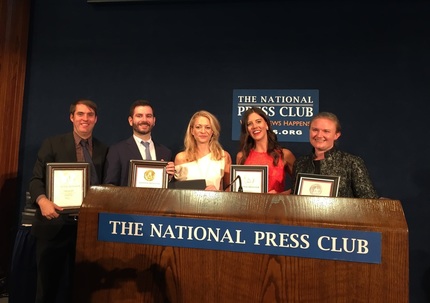2016 National Press Club Ann Cottrell Free Animal Reporting Award Winners
Justin Jouvenal, Washington Post, Ben Newman, Nightline, Jenna Millman, Nightline, Kaleigh Rogers, VICE/Motherboard, Jennifer Strong, Public Radio International, at the National Press Club 2016 Journalism Awards dinner, Aug. 4, 2016.
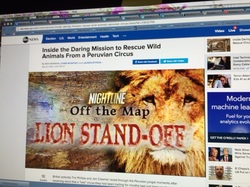
Broadcast:
Winner
Off The Map: The Lion Stand-Off -- ABC News, Nightline
Nightline joined Animal Defenders International (ADI) during the critical final days of their decade long operation to stamp out wild animal circus acts in Peru. They were there to document the safe release of more than 40 primates rescued from deplorable conditions across the country and the combative seizures of what are believed to be the last big cats held in illegal circuses openly defying new laws against animal performances.
Over four days of near continuous action, the Nightline team was able to capture the inspired compassion of Tim Phillips and Jan Creamer, the crusading husband and wife team behind ADI, the desperate plight of animals forced into a life in entertainment and the complicated reality of two Peruvian circus families struggling to accept a direct challenge to their livelihood.
By embedding itself with ADI and Peruvian authorities, Nightline was able to show the public the brutal treatment of animals in travelling circuses across South America. Nightline says it will continue to follow and report on ADI’s efforts as they set their sights on other countries, including Mexico.
Winner
Off The Map: The Lion Stand-Off -- ABC News, Nightline
Nightline joined Animal Defenders International (ADI) during the critical final days of their decade long operation to stamp out wild animal circus acts in Peru. They were there to document the safe release of more than 40 primates rescued from deplorable conditions across the country and the combative seizures of what are believed to be the last big cats held in illegal circuses openly defying new laws against animal performances.
Over four days of near continuous action, the Nightline team was able to capture the inspired compassion of Tim Phillips and Jan Creamer, the crusading husband and wife team behind ADI, the desperate plight of animals forced into a life in entertainment and the complicated reality of two Peruvian circus families struggling to accept a direct challenge to their livelihood.
By embedding itself with ADI and Peruvian authorities, Nightline was able to show the public the brutal treatment of animals in travelling circuses across South America. Nightline says it will continue to follow and report on ADI’s efforts as they set their sights on other countries, including Mexico.
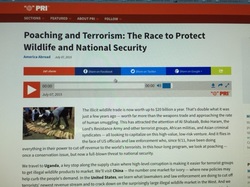
Broadcast:
Honorable Mention Poaching and Terrorism: The Race to Protect Wildlife and National Security -- Jennifer Strong, Public Radio International & America Abroad Media Jennifer Strong did an excellent job of explaining how poaching has become a significant source of funding for Al Shabaab, Boko Haram, and other terrorist groups, along with African militias, and Asian crime syndicates - all looking to capitalize on this high-value, low-risk venture. To illustrate the challenges facing law enforcement and the tactics being employed, Strong traveled to San Francisco’s Chinatown, where in a single afternoon she observed sales in multiple stores with open conversations about the legality of the pieces shoppers were eyeing. In New York she covered the public destruction of more than 2,000 pounds of seized ivory statues and figurines that were dyed or otherwise altered to look like legal antiques. She also spoke with policy experts on Capitol Hill and at federal agencies, and met with leading experts in the forensics of laundering the proceeds of poaching. Her report underscored the dire threat to wildlife as long as poaching is a major source of revenue to terrorist groups around the world. A several-months long investigation by NBC News revealed that some of the country’s biggest retailers were passing off garments labeled and advertised as containing “faux fur” were actually made from the fur of real animals, including rabbits, coyotes and raccoon dogs. |
|
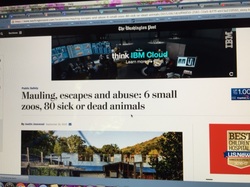
Print/Online:
Winner
Maulings, escapes and abuse: 6 small zoos, 80 sick or dead animals -- Justin Jouvenal, The Washington Post
Sparked by court testimony of callous animal abuse at a roadside zoo, reporter Justin Jouvenal wondered if there might be a larger story to report. He began an investigation of small area zoos that would eventually uncover starving animals, a mauling by two jaguars and a federal agency that failed to effectively regulate zoos across the country.
Using government inspection records, Freedom of Information Act requests, extensive interviews and visits to all 10 D.C. area roadside zoos, Jouvenal found problems that included a tiger that was kept in a crate in a kitchen and was allowed to eat plastic and human medicines, a monkey with frostbite that went untreated so long the animal had to be euthanized and cages so decrepit that big cats could easily escape and maul visitors. He also discovered that most workers had minimal training and that there are few requirements to opening a roadside zoo. He also found that the government agency charged with regulating these zoos, the Animal and Plant Health Inspection Service at the USDA, had undertaken even fewer enforcement actions that it had been criticized for in an inspector general’s report ten years prior.
After Jouvenal filed his FOIA requests for the story that appeared on the front page of the Washington Post in September, the government agency dramatically increased its enforcement actions and the story raised public awareness of the sad plight of animals housed in D.C. area roadside zoos. When the largest company in Indianapolis, pharmaceutical giant Eli Lilly, announced in 2012 that it would aggressively expand its animal-medicine division, the Indianapolis Star decided the time was ripe for an examination of the little-known and lucrative world of these specialty drugs.
Winner
Maulings, escapes and abuse: 6 small zoos, 80 sick or dead animals -- Justin Jouvenal, The Washington Post
Sparked by court testimony of callous animal abuse at a roadside zoo, reporter Justin Jouvenal wondered if there might be a larger story to report. He began an investigation of small area zoos that would eventually uncover starving animals, a mauling by two jaguars and a federal agency that failed to effectively regulate zoos across the country.
Using government inspection records, Freedom of Information Act requests, extensive interviews and visits to all 10 D.C. area roadside zoos, Jouvenal found problems that included a tiger that was kept in a crate in a kitchen and was allowed to eat plastic and human medicines, a monkey with frostbite that went untreated so long the animal had to be euthanized and cages so decrepit that big cats could easily escape and maul visitors. He also discovered that most workers had minimal training and that there are few requirements to opening a roadside zoo. He also found that the government agency charged with regulating these zoos, the Animal and Plant Health Inspection Service at the USDA, had undertaken even fewer enforcement actions that it had been criticized for in an inspector general’s report ten years prior.
After Jouvenal filed his FOIA requests for the story that appeared on the front page of the Washington Post in September, the government agency dramatically increased its enforcement actions and the story raised public awareness of the sad plight of animals housed in D.C. area roadside zoos. When the largest company in Indianapolis, pharmaceutical giant Eli Lilly, announced in 2012 that it would aggressively expand its animal-medicine division, the Indianapolis Star decided the time was ripe for an examination of the little-known and lucrative world of these specialty drugs.
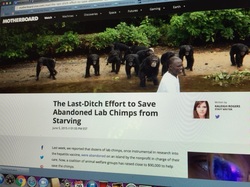
Print/Online:
Honorable Mention
Four-part series on the plight of former New York Blood Center research chimpanzees abandoned on an island in Liberia -- Kaleigh Rogers, Motherboard, VICE Media
After about 30 years of using a colony of chimpanzees in Liberia for biomedical research, which ended 10 years ago, the New York Blood Center withdrew all funding for them, leaving them to starve on an island in Liberia. The Blood Center said that it no longer had responsibility for the chimps and left them in the hands of the Liberian government, which was not providing care. This prompted animal welfare groups, including the Jane Goodall Institute, to urge the Center to reconsider its decision and to step in with emergency care and funds to keep the chimps alive.
Kaleigh Rogers was among the first to write about what was happening to the chimps and her reporting helped launch public awareness about their plight. Her stories were the result of months of reporting, dozens of interviews and hours poring over confidential documents. After her reporting, the Humane Society of the United States was able to raise hundreds of thousands of dollars to help care for the chimps and former Blood Center funders like CitiGroup also stepped up with contributions. The fate of these chimpanzees is still uncertain but Rogers has promised to continue telling their story.
Honorable Mention
Four-part series on the plight of former New York Blood Center research chimpanzees abandoned on an island in Liberia -- Kaleigh Rogers, Motherboard, VICE Media
After about 30 years of using a colony of chimpanzees in Liberia for biomedical research, which ended 10 years ago, the New York Blood Center withdrew all funding for them, leaving them to starve on an island in Liberia. The Blood Center said that it no longer had responsibility for the chimps and left them in the hands of the Liberian government, which was not providing care. This prompted animal welfare groups, including the Jane Goodall Institute, to urge the Center to reconsider its decision and to step in with emergency care and funds to keep the chimps alive.
Kaleigh Rogers was among the first to write about what was happening to the chimps and her reporting helped launch public awareness about their plight. Her stories were the result of months of reporting, dozens of interviews and hours poring over confidential documents. After her reporting, the Humane Society of the United States was able to raise hundreds of thousands of dollars to help care for the chimps and former Blood Center funders like CitiGroup also stepped up with contributions. The fate of these chimpanzees is still uncertain but Rogers has promised to continue telling their story.
